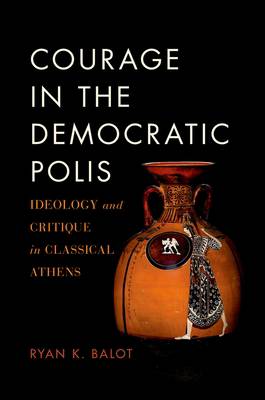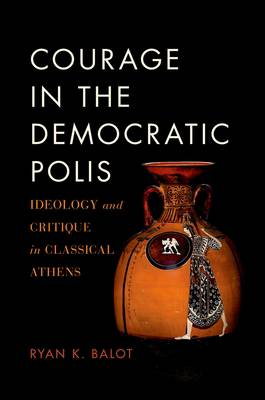
Je cadeautjes zeker op tijd in huis hebben voor de feestdagen? Kom langs in onze winkels en vind het perfecte geschenk!
- Afhalen na 1 uur in een winkel met voorraad
- Gratis thuislevering in België vanaf € 30
- Ruim aanbod met 7 miljoen producten
Je cadeautjes zeker op tijd in huis hebben voor de feestdagen? Kom langs in onze winkels en vind het perfecte geschenk!
- Afhalen na 1 uur in een winkel met voorraad
- Gratis thuislevering in België vanaf € 30
- Ruim aanbod met 7 miljoen producten
Zoeken
Courage in the Democratic Polis
Ideology and Critique in Classical Athens
Ryan K Balot
Paperback | Engels
€ 93,45
+ 186 punten
Uitvoering
Omschrijving
In this careful and compelling study, Ryan K. Balot brings together political theory, classical history, and ancient philosophy in order to reinterpret courage as a specifically democratic virtue. Ranging from Thucydides and Aristophanes to the Greek tragedians and Plato, Balot shows that the ancient Athenians constructed a novel vision of courage that linked this virtue to fundamental democratic ideals such as freedom, equality, and practical rationality. The Athenian ideology of courage had practical implications for the conduct of war, for gender relations, and for the citizens' self-image as democrats. In revising traditional ideals, Balot argues, the Athenians reimagined the emotional and cognitive motivations for courage in ways that will unsettle and transform our contemporary discourses. Without losing sight of political tensions and practical conflicts, Balot illustrates the merits of the Athenian ideal, provocatively explaining its potential to enlarge our contemporary understandings of politics and ethics. The result is a remarkable interdisciplinary work that has significant implications for the theory and practice of democracy, both ancient and modern.
Specificaties
Betrokkenen
- Auteur(s):
- Uitgeverij:
Inhoud
- Aantal bladzijden:
- 426
- Taal:
- Engels
Eigenschappen
- Productcode (EAN):
- 9780190879525
- Verschijningsdatum:
- 1/06/2018
- Uitvoering:
- Paperback
- Formaat:
- Trade paperback (VS)
- Afmetingen:
- 156 mm x 234 mm
- Gewicht:
- 648 g

Alleen bij Standaard Boekhandel
+ 186 punten op je klantenkaart van Standaard Boekhandel
Beoordelingen
We publiceren alleen reviews die voldoen aan de voorwaarden voor reviews. Bekijk onze voorwaarden voor reviews.









